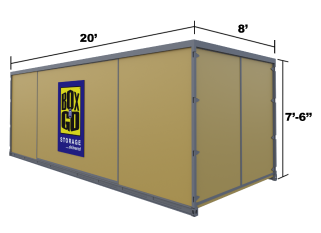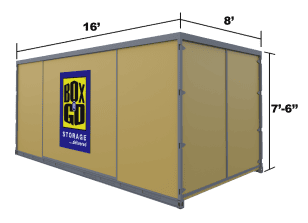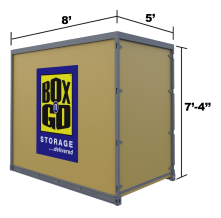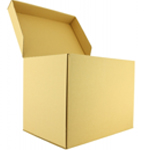Common Things You Should Not Store or Do in a Storage Unit



REVIEWS
RATING
GUARANTEE
Store on your driveway or inside our secure facility. Load/unload only once. Ground level access.


20’ Container – all weather.
Perfect for 3-bedroom residence.
5-7 rooms, furniture, appliances, etc.

16’ Container – all weather.
Perfect for 2-bedroom residence.
3-5 rooms, furniture, appliances, etc.

8’ Container – all weather.
Modular – works for any need.
Each fits 1-1.5 rooms.

- Call or order online in minutes
- We deliver storage to you
- Pack at home, at your convinience
- Store on your property or at indoor facility
- Move locally or nationwide
- Call or order online in minutes
- We deliver 16′ and 20′ storage to you
- Pack at home, loading labor available
- Store on your property
- Secured Extra Space


- No truck to rent. We deliver storage to you!
- Load/Unload only once.
- Pay only for space you use.
- Secure, climate-friendly facility.
- Drive-up access
- Save money and time.
- Reduce the risk of accidents and injuries.
- No need to pay for gas, insurance & mileage!
- You only need to load your belongings once!
- No need to load and unload it all again into a storage unit.
- All containers come with easy ground level access!
(if storing at our facility)
- No not need to guess on how much space you actually need.
- Order an extra 8’ x 5’ unit. Do not use it – do not pay for it.
- Highest degree of security and protection.
- Our 8’ x 5’ units are breatheable – no mold or mildew.
- No funky smell when your belongings return.
(if storing at our facility)
- Access your units at ground level.
- No elevators, ramps, stairs to climb.
- Schedule access appointment & drive straight to your units.

A storage unit can be a lifesaver for people facing a life transition. Also for folks who need more space in their home. Or for businesses that need a place for supplies and equipment. In all of those cases, storage facilities can handle most things that you want to keep there. However, there are limits to how you can use your storage unit. Here are some common things that are prohibited from storage.
Things You Shouldn’t Do in a Storage Unit
You should not live in the unit. If you live in a city where rent is expensive, you may want to try to live in your storage unit. In a place like Washington DC where the average apartment monthly rental is $2263, living in a 10′ x 11′ storage for $222 may seem like a great way to save a couple of grand every month. It isn’t. Living in your unit isn’t just against the rules you agreed to when you signed the storage rental agreement, it’s against the law.
Wherever you are, there are building codes for places where people live in. Since storage facilities are not residences, storage units don’t meet the building code standard for human habitation. That’s what makes living your unit illegal. You may now think that building codes are made to keep you out of a really cheap place to live. These regulations actually are for your safety. They say a legal residence must have things like plumbing, ventilation, and two means of egress. Storage units don’t meet these standards. You will be uncomfortable and in potential danger if you try to live one.
Still you may believe that you are stealthy enough to live undetected in a storage unit. You’re wrong. Every facility has measures to reveal if someone is living there. For example, some facilities monitor security cameras while others review the use of entry and exit codes. When the storage facility manager realizes you are living in the unit, you will be removed along with your stuff. If you’re living in the unit with your children, you could be facing more trouble than eviction. Criminal charges are the real risks in this situation.
You should not smoke or cook in your unit.
Smoking and cooking in your unit are fire hazards. Were you to cause a fire, you would be liable for both injuries and any property loss.
You should not operate a business from your unit.
Using a storage unit as the place where you conduct your business is usually against storage facility policy. It’s not to prevent you from getting cheap commercial rent. It’s to protect you, your employees, and your customers from the same dangers that are there if you were living in a storage unit. Fortunately, some facilities have appropriate office space that you can rent. Also it’s fine to store your business supplies and equipment in a unit.
You should not run appliances in your unit.
Storage facilities don’t have a problem with storing appliances, but running appliances is not allowed. Most appliances cannot be operated safely in a storage unit.
You should not wire a unit.
The time you spent online looking up how to run electricity to your storage unit was wasted. The storage facility will notice the increased electricity usage. Then you and your stuff will get the boot.
You should not kennel your pets in storage.
Live animals are prohibited in storage. Storage facilities are not a safe place for animals. Putting animals in storage could subject you to a criminal charge of animal cruelty.
Stuff You Shouldn’t Stash in a Storage Unit
Perishable Food.
While canned goods are usually fine to put in storage, all perishable food, including pet food, is prohibited. Not only would stored perishable food smell and spoil, it also attracts bugs and rodents. You don’t want those critters in your stuff and neither do the folks in the units near yours.
Cash.
Your locked storage unit is very secure, however, keeping cash is storage is just not smart. If the cash were to go missing, you have no remedy. Even if you’ve insured your stored stuff, the insurance policy won’t reimburse your cash.

Fine Art.
There’s a reason not to store fine artwork in addition to the obvious potential for theft. Unless the unit is climate friendly, storage units can experience extreme heat and cold. These extreme temperatures could damage your art.
Anything Irreplaceable.
Anything that is irreplaceable, even if you have the funds, should not be in your storage unit. Some examples are family heirlooms and valuable jewelry. Like art, these items could be also be damaged by extreme temperatures. Additionally, you don’t want to find yourself in the same situation as the daughters of Malcolm X. They had to hire a lawyer to retrieve their father’s papers which had been sold in an auction because they were part of the contents of a storage unit that wasn’t current on its rent.
Items Prohibited for Storage – Chemicals, Hazardous Waste, and Explosives.
Materials that are too dangerous to store in your home or business also pose too much of a hazard to keep in storage. Any material that is inherently flammable, toxic, or explosive should never be placed in storage. Here are examples of common hazardous materials that don’t belong in storage:
Fireworks
Gasoline
Fertilizer
Kerosene
Ammunition
Propane
Paint
Paint thinner
Cleaners
Motor oil
Acid
Grease
Illegal Drugs
Firearms.
As you just saw, ammunition is always prohibited as an explosive, but what about your guns? In some states, it is illegal to keep firearms in a storage unit. Even if having unloaded firearms in storage isn’t breaking the law in your area, most storage facilities still don’t allow them because of their inherent danger.
Plants.
Your pots, garden tools, water hose, and other plant paraphernalia are welcome, but plants themselves are a no-no. Your storage unit doesn’t provide light and water your plants need to live. Storage facilities don’t want plants in their units due to their potential to attract vermin.
Stolen Goods.
You know they shouldn’t be in your possession anyway. The storage facility does not want to become a part of your criminal activity.
Vinyl Records.
Unless your unit is climate friendly, extreme heat can cause your records to warp, which makes them unplayable.
Store with Box-n-Go
While Box-n-Go storage is no different from any other storage when it comes to prohibited items, our consultants may help you understand the issues. When it comes to storage, there is no easier way to store than the portable storage. this is what Box-n-Go does. Simply call us at 1-877-269-6461 and we will be happy to help.

